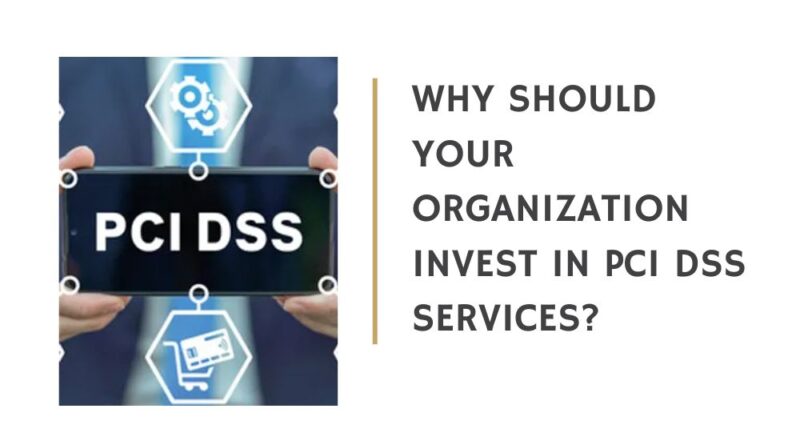Why Should Your Organization Invest in PCI DSS Services?
Ensuring the security of credit card information is crucial for businesses in the current digital era, as more and more transactions take place online. To safeguard cardholder data and stop fraud, the Payment Card Industry Data Security Standard (PCI DSS) lays out rules and specifications. This blog discusses the benefits of PCI DSS services investment for businesses handling credit card data.
Understanding PCI DSS
The Payment Card Industry Data Security Standard (PCI DSS) is a set of security standards established to protect cardholder data during and after a financial transaction. Developed by major credit card companies like Visa, MasterCard, American Express, and others, PCI DSS aims to ensure the secure handling of sensitive information and reduce the risk of data breaches and fraud.
The Purpose of PCI DSS
The primary goal of PCI DSS is to provide a framework for securing cardholder data. By implementing these standards, businesses can protect sensitive information, maintain customer trust, and comply with legal and regulatory requirements related to payment card transactions.
Core Requirements of PCI DSS
PCI DSS consists of twelve core requirements organized into six key objectives:
Build and Maintain a Secure Network and Systems
- Install and Maintain a Firewall Configuration: Establish and maintain a firewall to protect cardholder data.
- Do Not Use Vendor-Supplied Defaults for System Passwords: Change default passwords and security parameters to secure systems and applications.
Protect Cardholder Data
- Protect Stored Cardholder Data: Encrypt cardholder data when stored on disk or transmitted over public networks.
- Encrypt Transmission of Cardholder Data Across Open, Public Networks: Use encryption protocols to protect cardholder data during transmission.
Maintain a Vulnerability Management Program
- Protect All Systems Against Malware and Regularly Update Anti-Virus Software: Deploy and maintain anti-virus software to protect systems from malicious software.
- Develop and Maintain Secure Systems and Applications: Implement strong security practices when developing and maintaining systems and applications.
Implement Strong Access Control Measures
- Restrict Access to Cardholder Data by Business Need to Know: Limit access to cardholder data and apply access control measures based on job responsibilities.
- Identify and Authenticate Access to System Components: Implement strong authentication mechanisms to verify the identity of users accessing systems.
Regularly Monitor and Test Networks
- Track and Monitor All Access to Network Resources and Cardholder Data: Monitor and log all access to network resources and cardholder data to detect and respond to suspicious activities.
- Regularly Test Security Systems and Processes: Conduct regular security testing and assessments to identify vulnerabilities and weaknesses in security controls.
Maintain an Information Security Policy
- Maintain a Policy That Addresses Information Security for Employees and Contractors: Develop, maintain, and enforce a security policy that addresses information security for all employees and contractors.
Benefits of Investing in PCI DSS Services
Enhanced Security and Risk Mitigation
By complying with PCI DSS requirements and investing in related services, organizations strengthen their security posture and reduce the risk of data breaches and fraudulent activities. Implementing robust security measures protects cardholder data and safeguards the organization’s reputation.
Compliance with Legal and Regulatory Requirements
Many industries and jurisdictions have legal and regulatory requirements mandating compliance with PCI DSS standards. Investing in PCI DSS services helps organizations meet these obligations and avoid potential penalties or sanctions for non-compliance.
Protection of Customer Trust and Reputation
Consumers expect businesses to protect their payment card information securely. Investing in PCI DSS services demonstrates a commitment to data security and enhances customer trust. A strong reputation for security can attract and retain customers, contributing to long-term business success.
Cost-Effective Security Measures
While investing in PCI DSS services involves upfront costs, the long-term benefits outweigh the expenses. Preventing data breaches and fraud incidents through proactive security measures helps organizations avoid costly financial losses, legal fees, and reputational damage.
Best Practices for Implementing PCI DSS Services

To maximize the effectiveness of PCI DSS investments, organizations should follow best practices:
Conduct Regular Security Assessments
Regularly assess and audit security controls to identify vulnerabilities and gaps in compliance with PCI DSS requirements. Implement corrective actions promptly to mitigate risks and strengthen security defenses.
Engage Qualified PCI DSS Service Providers
Partner with qualified PCI DSS service providers who have expertise in implementing and maintaining PCI DSS compliance. These professionals can provide guidance, support, and assistance throughout the compliance process.
Educate Employees on Security Policies and Procedures
Ensure that all employees understand their roles and responsibilities in maintaining PCI DSS compliance. Provide regular training and awareness programs to promote a culture of security within the organization.
Implement Incident Response and Contingency Plans
Develop and maintain incident response and contingency plans to address potential security breaches or data incidents promptly. Test these plans regularly to ensure readiness and effectiveness in mitigating risks.
Conclusion
Investing in PCI DSS services is essential for organizations that handle payment card information. By adhering to PCI DSS standards, businesses can protect cardholder data, comply with regulatory requirements, maintain customer trust, and mitigate security risks effectively. Embracing PCI DSS as a framework for data security not only enhances organizational resilience but also supports sustainable business growth in an increasingly digital and interconnected world.
Note:-To read more articles visit on nichenest.




